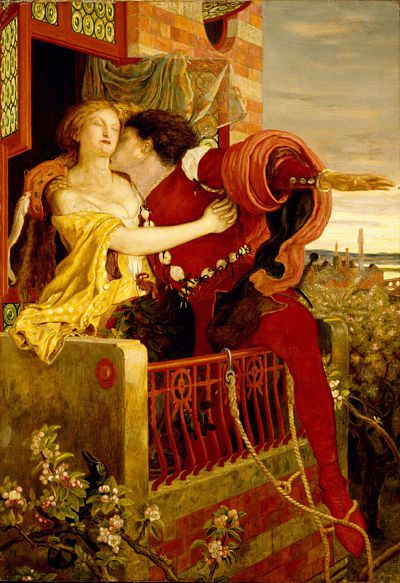 Woe is not romantic, but art can make it feel that way. If a piece of literature, a movie, or a play is true to life, woe or sorrow or misery are good signs that you are in trouble. If nothing else, when romance hurts, physically or mentally, it is time to step back, get outside help, and consider whether a sickness had masqueraded as love.
Woe is not romantic, but art can make it feel that way. If a piece of literature, a movie, or a play is true to life, woe or sorrow or misery are good signs that you are in trouble. If nothing else, when romance hurts, physically or mentally, it is time to step back, get outside help, and consider whether a sickness had masqueraded as love.
Shakespeare made the difference between true love and an overly violent, hasty affection plain in Romeo and Juliet.
Somebody put Romeo and Juliet in the curriculum for high school students when I was young (despite what my kids think, this was not during the first run of the play) which had a similar impact on me as introducing an unlimited supply of sugar does on captive lab animals. I feasted on the romance and missed the point of the play.
I needed someone to point out the obvious: killing yourself for love is not very loving.
Still the grownups around Romeo and Juliet are the main problem not the lovers. The “grownups” are violent and are tearing their city apart to satisfy senseless hate. Young adults do not have hard enough hearts for violence and so hatred breeds death beginning with the young. The grownups repent finally, but not soon enough to save Romeo and Juliet.
Some of us live in openly violent places in America, but most of us indulge in virtual violence. These passions, these social hatreds, do not create communities that breed true love any more than the open feuds of Shakespeare’s Verona.
Violence breeds hasty and false romance.
If we say someone is “passionate,” we mean to compliment them, but he ought to be warned. Passion is wonderful, the fuel for any great deed, but like any combustible it is dangerous. I fear we forget the danger in praising the power of passion. Passion can easily become violent and violence is most dangerous to love.
If a society allows senseless and unjust violence, then love will be corrupted and go awry. Do not expect a good relationship from a bad community without a miracle. I see this sometimes in the lives of former students who have come out of controlling and hateful homes. The anger of the home produces grand passions, but passions without patience.
Patience is important to passion.
Romeo cannot wait. In the course of a few days he goes from a mad desire for Rosalind to Juliet to dead. If Romeo had been patient, he could have helped Juliet and lived. He was violent in his passions and destroyed everything. Nobody in the play gives very good advice, but the local Christian sage gives the best advice Verona has to offer. Romeo cannot wait and allow plans to develop.
He cannot live without Juliet and so never gets to live with her.
True love prefers life to death . . . always.
Here is a plain fact: if you love, then you most often have to say goodbye. Somebody will die first. If it is you, then you bring pain to your beloved. If she dies first, then you must live without her. There is no good outcome, but love knows the rules, knows the goodness of God, understands God is love, and so is patient in the face of death.
My Nana never remarried after Papaw died. She did not wish to do so, even when she had the chance, because she was still in love. Death lost some sting, because on the other side of death would be eternal life with her beloved. Yet she was patient enough to let God’s good plan work out in her life. There was good behind her in the love she shared with Papaw and good ahead of her in the love she would find again with him in Paradise, but she was willing to wait. She knew that to rush the godly plan can have painful consequences. Nana lived a cheerful life between the romance of her earthly life and the romance she would find again in eternity.
She preferred life to death until life was done and then was content to die. True love waits.
Romeo and Juliet have a grand passion that never becomes love, because violence in their own natures has been bred by violent families. Let’s flee violence, embrace patience, and find love.
————————————————
William Shakespeare went to God four hundred years ago. To recollect his death, I am writing a personal reflection on a few of his plays. The Winter’s Tale started things off, followed by As You Like It.











